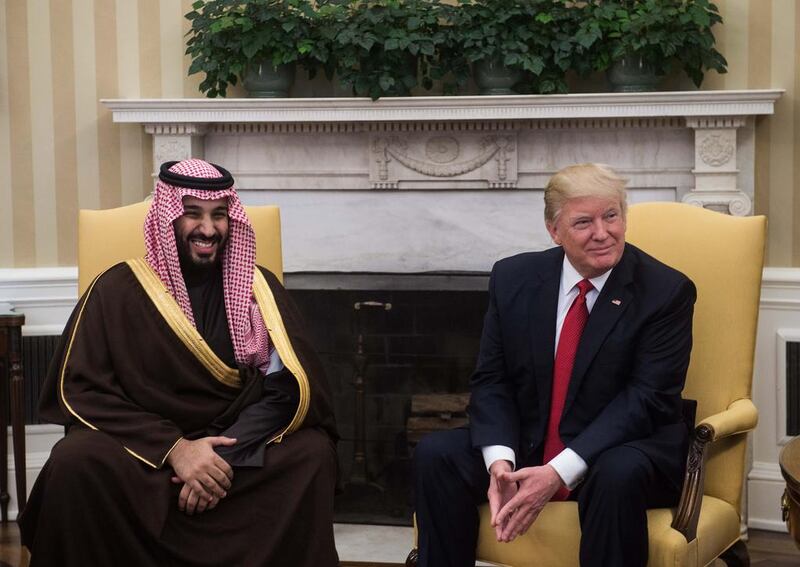WASHINGTON // Saudi Arabia hailed a “historical turning point” in US-Saudi relations after a meeting between Deputy Crown Prince Mohammed bin Salman and President Donald Trump highlighted the two leaders’ shared the view that Iran posed a regional security threat.
The meeting on Tuesday appeared to signal a meeting of the minds on many issues between Mr Trump and Prince Mohammed, in a marked difference from Riyadh’s often fraught relationship with the Obama administration, especially after the 2015 Iran nuclear deal.
“This meeting is considered a historical turning point in relations between both countries and which had passed through a period of divergence of views on many issues,” a senior adviser to Prince Mohammed said.
“But the meeting today restored issues to their right path and form a big change in relations between both countries in political, military, security and economic issues,” he said.
Saudi Arabia had viewed with unease the administration of Barack Obama, whom they felt considered Riyadh’s alliance with Washington less important than negotiating the Iran nuclear deal.
Riyadh and other Gulf allies see in Mr Trump a strong president who will shore up Washington’s role as their main strategic partner and help contain Riyadh’s adversary Iran in a region central to US security and energy interests, regional analysts said.
The deputy crown prince viewed the nuclear deal as “very dangerous”, the adviser said, adding that both leaders had identical views on “the danger of Iran’s regional expansionist activities”. The White House has said the deal was not in the best interest of the US.
Iran denies interference in Arab countries.
The meeting with the prince was the first since Mr Trump’s inauguration on January 20. Prince Mohammed is leading the kingdom’s efforts to revive state finances by diversifying the economy away from a reliance on falling crude oil revenues.
Under the plan, which seeks to promote the private sector and make state-owned companies more efficient, Riyadh plans to sell up to 5 per cent of state oil giant Saudi Aramco in what is expected to be the world’s biggest initial public offering.
The two leaders, who discussed opportunities for US companies to invest in Saudi Arabia, began their talks in the Oval Office.
US vice president Mike Pence, Mr Trump’s senior adviser and son-in-law, Jared Kushner, chief of staff Reince Priebus and strategist Steve Bannon were also present at the meeting.
It appeared to illustrate support for some of the most contentious issues that Mr Trump has faced since taking office.
On a travel ban against six Muslim-majority countries, the adviser said Prince Mohammed did not regard it as one that was aimed at “Muslim countries or Islam”.
Earlier this month, Mr Trump signed a revised executive order on banning citizens from Iran, Libya, Somalia, Sudan, Syria and Yemen from travelling to the US but removed Iraq from the list, after his controversial first attempt was blocked in the court.
Mr Trump’s travel ban has come under criticism for targeting citizens of several mainly Muslim countries. The senior adviser said Prince Mohammed “expressed his satisfaction after the meeting on the positive position and clarifications he heard from President Trump on his views on Islam”.
* Reuters





